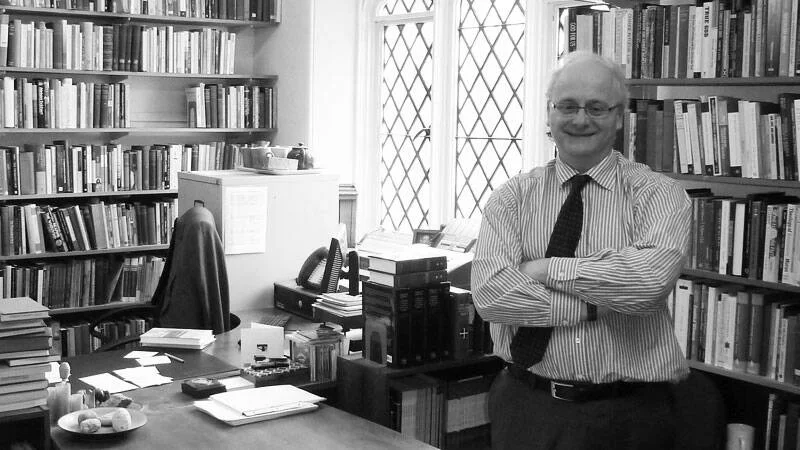May 25, 2016 was a day to be forgotten by most historical books and hardly recognized by its contemporary chroniclers. Were it not for digital publication, hardly a record of the tremor would have even been felt. Yet, that day marks the death of one whom Kevin Vanhoozer has called the “greatest living theologian,” John Webster.
Webster was, to be sure, a theologian of theologians. As any theologically minded reader who has ventured into the land of Webster would attest, the terrain is not an easy trek . . . but it is wondrous. Rather like walking on uneven ground—each step attended to with utmost care, horizon recognized only by the occasional upward glance—each sentence of Webster’s theological writing requires the utmost attention. So, it is understandable that many pastors and lay churchmen (and, more shamefully, a few too many theologians) know so little of his name.
That does not, however, change the fact of his enduring legacy, or the influence that he has left on the current and next generation of evangelical theologians. Although I never met the man personally, those that knew him have attested that he was a soft-spoken man with an abiding love of our Triune God, who was committed to preserving the simplicity and purity of the gospel message.
John Webster as Theological Essayist (with a note on Sapientia)
Sapientia emerged as an idea just over a year ago. It was conceived as a hybrid digital periodical, intended to harness the best of news rags, academic journals, and the emerging digital communication within the venue of an academic center (the Henry Center). What all three media share in common is a commitment to communication, the sharing of life and ideas as things happen and people and ideas appear across the public landscape and ripple throughout public life.
As our content guidelines for Sapientia have taken shape, I have been increasingly convinced that dialogical reflections on theological works [T]he passing on (traditio) of ideas is not an abstract phenomenon, but bound with the personal touch of people in communion with one another and in response to the living and holy God.is a neglected genre, and one uniquely suited for the conversational and responsive nature of digital communications.On this count, Syndicate Theology is especially to be commended for what they’re doing in the digital publishing realm. Only rarely do we get glimpses into the actual thinkers and works that have shaped the minds of those whose ideas we trust, the books and essays that have left an irreversible mark on the course of one’s own life and thinking. If this is true of books in general, moreover, this is all the more true of essays, which are often as much (if not more) impacting in the logic of discovery and understanding.
Returning, then, to Webster: In Kevin’s moving testimonial of this once “greatest living theologian,” he mentioned not only his personal acquaintances with this theologian of theologians, but also the importance of Webster’s “The Dogmatic Location of the Canon” (reprinted in Word and Church) for the direction of Kevin’s own theological development. It got me thinking: While the late theologian has written many noteworthy monographs—that landmark of achievement for academic CVs and fool’s gold for personal banking accounts—the majority of Webster’s substantive works come in the form of the less glorious essay (albeit, now compiled into collections and published in manuscript form). He not only wrote articles, but he wrote very good articles.
What might be found in these short treasure troves? What has Webster written in these scores of essays such that makes him such a great theologian? And indeed, how have these essays influenced the theology of other theologians? What about his theological judgments was so insightful and what is the legacy that he has passed on to us, the next generation of theologians and, more broadly, witnesses of the gospel?
Essayist and Friend: A Year-Long Testimony
In consultation with Kevin, we decided that Sapientia was well-situated to call attention to his work by extending this tribute for the next year and focusing on a handful of Webster’s essays. The below group of theologians have benefited from Webster’s life and theology, and represent past students, colleagues, theological peers, and friends.
They have each been asked to select an article of John’s that was either influential in their own thinking or perceived as significant in the wider theological landscape. Each review article is thus focused less on a comprehensive summary and critique than on the context and impact of the argument. There will also undoubtedly be a mixture of personal testimony. This is only appropriate, since the passing on (traditio) of theological ideas is not an abstract phenomenon, but bound with the personal touch of people in communion with one another and in response to the living and holy God.
Indeed, this is itself a distinctive attribute of Webster’s theology already sounded in Mangina’s opening article, “The Church as Astonished Witness,” and where I myself have most benefited from John’s theology. As John himself would certainly want, we hope that this year-long tribute would not merely honor the theological career of a theologian, but also and more importantly promote sound, evangelical theology and, ultimately, lead to the worship of our triune God.






Comments
Be the first one to make a comment!